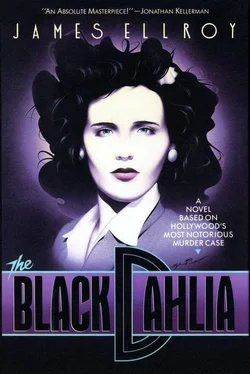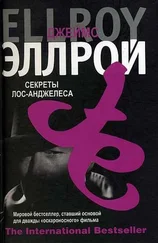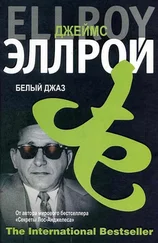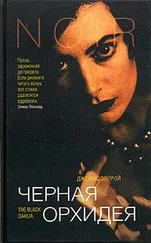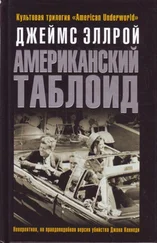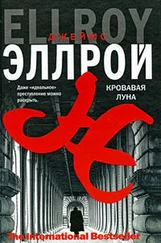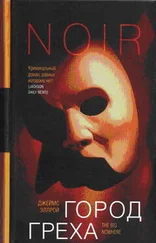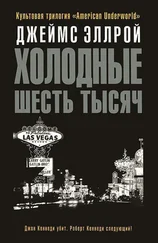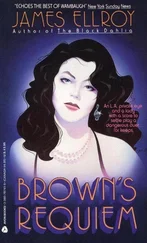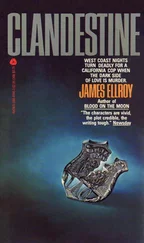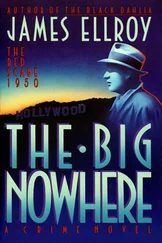James Ellroy
The Black Dahlia
To
Geneva Hilliker Ellroy
1915–1958
Mother:
Twenty-nine Years Later,
This Valediction in Blood
Now I fold you down, my drunkard, my navigator,
My first lost keeper, to love and look at later.
— Anne Sexton
I never knew her in life. She exists for me through others, in evidence of the ways her death drove them. Working backward, seeking only facts, I reconstructed her as a sad little girl and a whore, at best a could-have-been — a tag that might equally apply to me. I wish I could have granted her an anonymous end, relegated her to a few terse words on a homicide dick’s summary report, carbon to the coroner’s office, more paperwork to take her to potter’s field. The only thing wrong with the wish is that she wouldn’t have wanted it that way. As brutal as the facts were, she would have wanted all of them known. And since I owe her a great deal and am the only one who does know the entire story, I have undertaken the writing of this memoir.
But before the Dahlia there was the partnership, and before that there was the war and military regulations and manuevers at Central Division, reminding us that cops were also soldiers, even though we were a whole lot less popular than the ones battling the Germans and Japs. After duty every day, patrolmen were subjected to participation in air raid drills, blackout drills and fire evacuation drills that had us standing at attention on Los Angeles Street, hoping for a Messerschmitt attack to make us feel less like fools. Daywatch roll call featured alphabetical formations, and shortly after graduating the Academy in August of ’42, that was where I met Lee.
I already knew him by reputation, and had our respective records down pat: Lee Blanchard, 43-4-2 as a heavyweight, formerly a regular attraction at the Hollywood Legion Stadium; and me: Bucky Bleichert, light-heavy, 36-0-0, once ranked tenth by Ring magazine, probably because Nat Fleisher was amused by the way I taunted opponents with my big buck teeth. The statistics didn’t tell the whole story, though. Blanchard hit hard, taking six to give one, a classic head-hunter; I danced and counterpunched and hooked to the liver, always keeping my guard up, afraid that catching too many head shots would ruin my looks worse than my teeth already had. Style-wise, Lee and I were like oil and water, and every time our shoulders brushed at roll call, I would wonder: who would win?
For close to a year we measured each other. We never talked boxing or police work, limiting our conversation to a few words about the weather. Physically, we looked as antithetical as two big men could: Blanchard was blond and ruddy, six feet tall and huge in the chest and shoulders, with stunted bowlegs and the beginning of a hard, distended gut; I was pale and dark-haired, all lanky muscularity at 6 foot 3. Who would win?
I finally quit trying to predict a winner. But other cops had taken up the question, and during that first year at Central I heard dozens of opinions: Blanchard by early KO; Bleichert by decision; Blanchard stopped/stopping on cuts — everything but Bleichert by knockout.
When I was out of eye shot, I heard whispers of our non-ring stories: Lee coming on the LAPD, assured of rapid promotion for fighting private smokers attended by the high brass and their political buddies, cracking the Boulevard-Citizens bank heist back in ’39 and falling in love with one of the heisters’ girlfriends, blowing a certain transfer to the Detective Bureau when the skirt moved in with him — in violation of departmental regs on shack jobs — and begged him to quit boxing. The Blanchard rumors hit me like little feint-jabs, and I wondered how true they were. The bits of my own story felt like body blows, because they were 100 percent straight dope: Dwight Bleichert joining the Department in flight from tougher main events, threatened with expulsion from the Academy when his father’s German-American Bund membership came to light, pressured into snitching the Japanese guys he grew up with to the Alien Squad in order to secure his LAPD appointment. Not asked to fight smokers, because he wasn’t a knockout puncher.
Blanchard and Bleichert: a hero and a snitch.
Remembering Sam Murakami and Hideo Ashida manacled en route to Manzanar made it easy to simplify the two of us — at first. Then we went into action side by side, and my early notions about Lee — and myself — went blooey.
It was early June of ’43. The week before, sailors had brawled with zoot suit wearing Mexicans at the Lick Pier in Venice. Rumor had it that one of the gobs lost an eye. Skirmishing broke out inland: navy personnel from the Chavez Ravine naval base versus pachucos in Alpine and Palo Verde. Word hit the papers that the zooters were packing Nazi regalia along with their switchblades, and hundreds of in-uniform soldiers, sailors and marines descended on downtown LA, armed with two-by-fours and baseball bats. An equal number of pachucos were supposed to be forming by the Brew 102 Brewery in Boyle Heights, supplied with similar weaponry. Every Central Division patrolman was called in to duty, then issued a World War I tin hat and an oversize billy club known as a nigger knocker.
At dusk, we were driven to the battleground in personnel carriers borrowed from the army, and given one order: restore order. Our service revolvers had been taken from us at the station; the brass did not want .38’s falling into the hands of reet pleat, stuff cuff, drape shape, Argentine ducktail Mexican gangsters. When I jumped out of the carrier at Evergreen and Wabash holding only a three-pound stick with a friction-taped handle, I got ten times as frightened as I had ever been in the ring, and not because chaos was coming down from all sides.
I was terrified because the good guys were really the bad guys.
Sailors were kicking in windows all along Evergreen; marines in dress blues were systematically smashing streetlights, giving themselves more and more darkness to work in. Eschewing inter-service rivalry, soldiers and jarheads overturned cars parked in front of a bodega while navy youths in skivvies and white bell-bottoms truncheoned the shit out of an outnumbered bunch of zooters on the sidewalk next door. At the periphery of the action I could see knots of my fellow officers hobnobbing with Shore Patrol goons and MPs.
I don’t know how long I stood there, numbed, wondering what to do. Finally I looked down Wabash toward 1st Street, saw small houses, trees and no pachucos, cops or blood-hungry GIs. Before I knew what I was doing, I ran there full speed. I would have kept running until I dropped, but a high-pitched laugh issuing from a front porch stopped me dead.
I walked toward the sound. A high-pitched voice called out, “You’re the second young copper to take a powder from the commotion. I don’t blame you. Kinda hard to tell who to put the cuffs on, ain’t it?”
I stood on the porch and looked at the old man. He said, “Radio says cabdrivers been makin’ runs to the USO up in Hollywood, then bringin’ the sailor boys down here. KFI called it a naval assault, been playin’ ‘Anchors Aweigh’ every hour on the half hour. I saw some gyrenes down the street. You think this is what you call an amphibious attack?”
“I don’t know what it is, but I’m going back.”
“You ain’t the only one turned tail, you know. ‘Nuther big fella came runnin’ this way pronto.”
Pops was starting to look like a wily version of my father.
“There’s some pachucos who need their order restored.”
“Think it’s that simple, laddy?”
“I’ll make it that simple.”
Читать дальше
